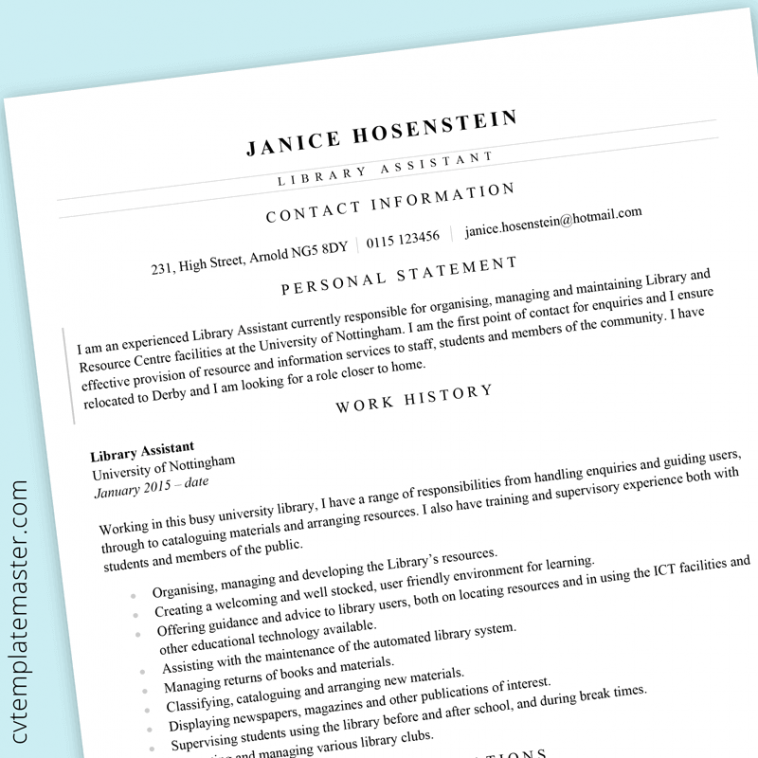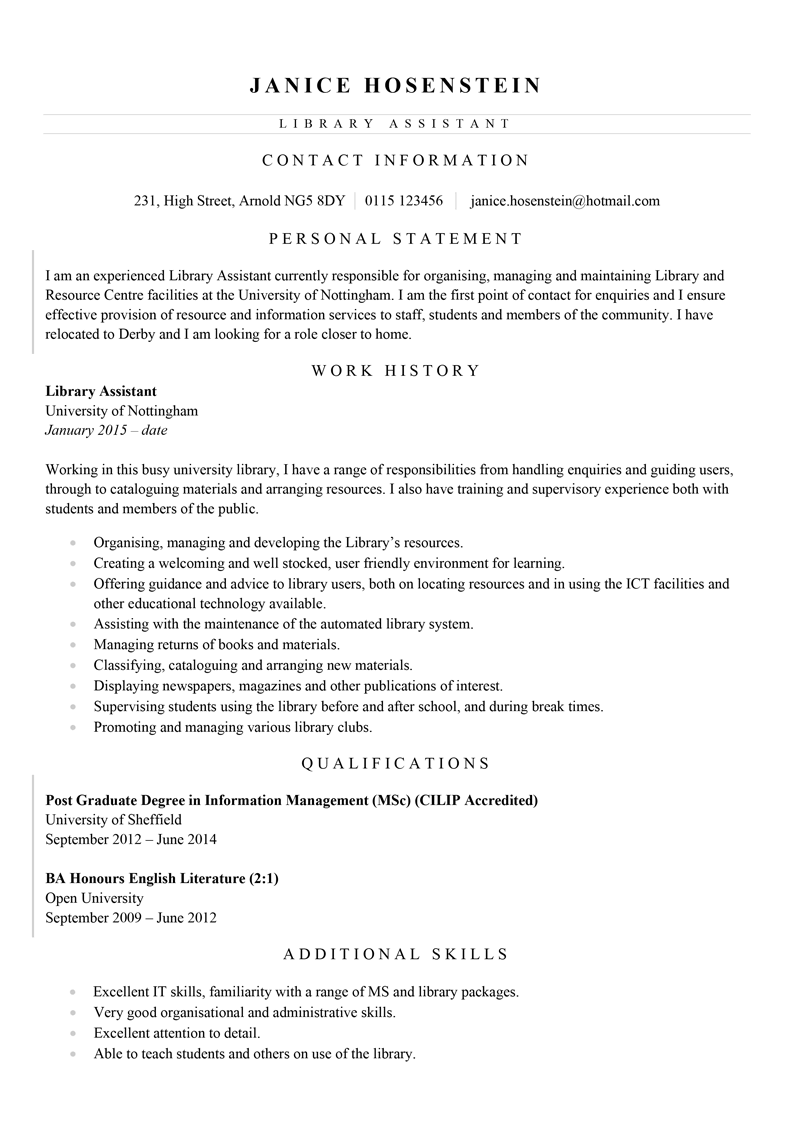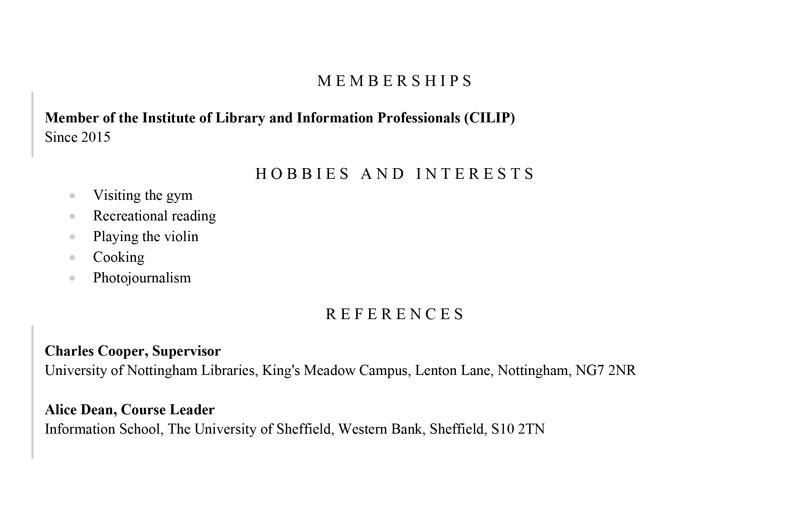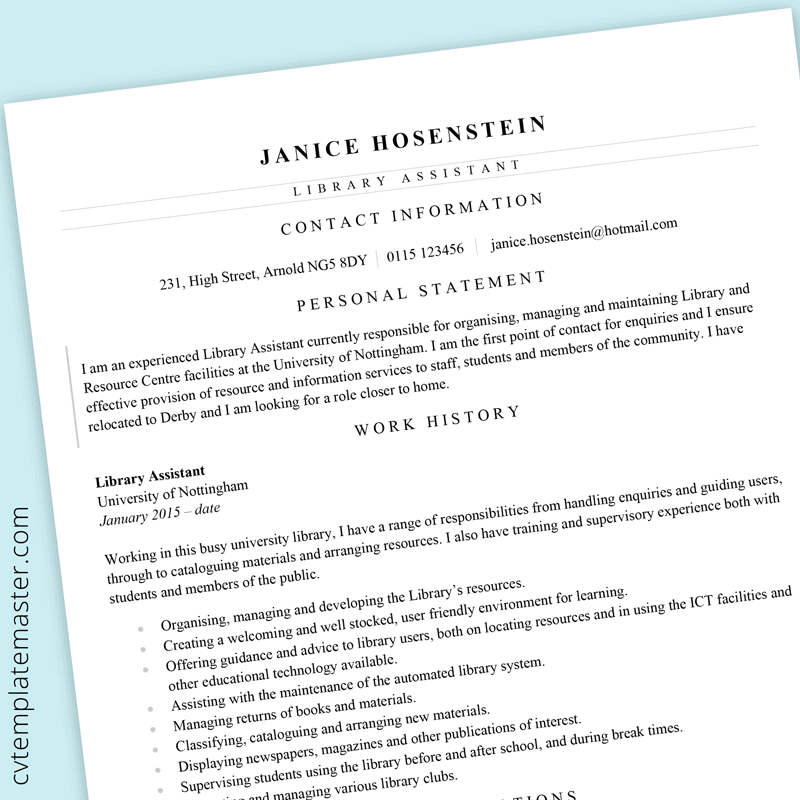Text preview of this CV template:
This is a text-only preview - download the formatted Word file using the link above.
JANICE HOSENSTEIN | LIBRARY ASSISTANT
CONTACT INFORMATION
231, High Street, Arnold NG5 8DY | 0115 123456 | janice.hosenstein@hotmail.com
PERSONAL STATEMENT
I am an experienced Library Assistant currently responsible for organising, managing and maintaining Library and Resource Centre facilities at the University of Nottingham. I am the first point of contact for enquiries and I ensure effective provision of resource and information services to staff, students and members of the community. I have relocated to Derby and I am looking for a role closer to home.
WORK HISTORY
Library Assistant
University of Nottingham
January 2015 – date
Working in this busy university library, I have a range of responsibilities from handling enquiries and guiding users, through to cataloguing materials and arranging resources. I also have training and supervisory experience both with students and members of the public.
- Organising, managing and developing the Library’s resources.
- Creating a welcoming and well stocked, user friendly environment for learning.
- Offering guidance and advice to library users, both on locating resources and in using the ICT facilities and other educational technology available.
- Assisting with the maintenance of the automated library system.
- Managing returns of books and materials.
- Classifying, cataloguing and arranging new materials.
- Displaying newspapers, magazines and other publications of interest.
- Supervising students using the library before and after school, and during break times.
- Promoting and managing various library clubs.
QUALIFICATIONS
Post Graduate Degree in Information Management (MSc) (CILIP Accredited)
University of Sheffield
September 2012 – June 2014
BA Honours English Literature (2:1)
Open University
September 2009 – June 2012
ADDITIONAL SKILLS
- Excellent IT skills, familiarity with a range of MS and library packages.
- Very good organisational and administrative skills.
- Excellent attention to detail.
- Able to teach students and others on use of the library.
MEMBERSHIPS
Member of the Institute of Library and Information Professionals (CILIP)
Since 2015
HOBBIES AND INTERESTS
- Visiting the gym
- Recreational reading
- Playing the violin
- Cooking
- Photojournalism
REFERENCES
Charles Cooper, Supervisor
University of Nottingham Libraries, King’s Meadow Campus, Lenton Lane, Nottingham, NG7 2NR
Alice Dean, Course Leader
Information School, The University of Sheffield, Western Bank, Sheffield, S10 2TN
Template details:

Here’s a full preview of page one of this Library Assistant CV:

And here’s page two …

How to write a library assistant CV
This quick guide will show you how to write a CV for a library assistant position.
Use this guide along with our Library Assistant CV template which contains example information to inspire your own CV writing.
As with CV writing for any role, always start with the job advertisement. This will tell you exactly which skills and experience your target employer is looking for. Make sure that you emphasise these desirables specifically when writing your ‘Personal Statement’ (sometimes called a ‘Personal Profile’ or ‘Career Objective’) which goes at the top of your CV.
There are various websites that can help you put together a great Curriculum Vitae for this job, if you’re not sure what sort of skills the employer is looking for. The National Careers Service has a good profile, UCAS has a decent list of skills, and Prospects.ac.uk has a detailed overview too.
Typically, for a Library Assistant role, employers will want to know that you are:
- Good at administration
- Able to communicate effectively, with a good knowledge of the English language
- Able to work well with others
- Thorough, with good attention to detail
- Able to deliver a high standard of customer service
- Able to work on your own
- Able to be flexible
- Able to demonstrate understanding and sensitivity
- IT literate
These key skills, together with any that the prospective employer has requested specifically, should resonate throughout your CV.
In addition, the following skills would be valued, although they are not essential for an assistant:
- Able to arrange IT access and solve user problems
- Up-to-date knowledge of new publications
- Understanding of Freedom of Information, Data Protection and Copyright laws
- Ability to promote the library’s services – for example, through displays, talks or reading clubs
- Ability to attend and contribute to meetings / conferences
Use one of our CV templates
In addition to this template we have a whole host of CV templates available in Microsoft Word format for you to download and edit. These are completely free for personal use. Using a template prompts you on what to include, and helps ensure that your CV is presented in the correct format. In addition, this layout is ATS-friendly, meaning that it should pass through Applicant Tracking System software without issues.
If you’re not keen on the layout of the template on this page, click here to see our full CV templates collection.
Leave off unnecessary personal information
Only include necessary personal information on your CV, such as your name, address, phone number and email address. DON’T include personal details that are irrelevant to the job, such as marital status, whether or not you have children, nationality or religion. These give prospective employers the opportunity to discriminate against you before you’ve even walked through the door.
You can, of course, include details of your LinkedIn profile – and this is a valuable opportunity to provide target employers with more detail about your experience and skills. Find out more about formatting a LinkedIn profile to support your job application here.
Write a strong work history section
Your work history section is the most important part of your CV. It provides your target employer with evidence that you have the key skills they are looking for, and can use them effectively. It’s therefore crucial to incorporate examples of these skills with your work history, which should be listed in reverse chronological order (most recent position first).
For example, consider which of these statements is more powerful:
“Able to use Library Cataloguing Systems.”
“In this role I used the Mandarin Cataloguing System to classify, catalogue and arrange new materials, for which I had sole responsibility.”
Clearly the second statement is more powerful as, rather than merely claiming the skill, you demonstrate that you have acquired and used it effectively.
Offer detail in your qualifications section
Formal qualifications aren’t essential to kick start your career in the library, but some qualifications are valuable for this type of role. For example, a good grasp of English language, Literature, Maths and IT will all be helpful – so detail any good grades you achieved for these subjects.
Include professional memberships
It’s worth considering joining CILIP – the Library and Information Association. Individual CILIP Membership costs relatively little compared to other professional bodies, and is open to everyone working in knowledge, information, data or librarianship. You’ll get practical advice and guidance to help you build your network, future proof your skills and demonstrate your professionalism to would-be employers. There’s also a package of membership benefits thrown in, such as online courses, an industry-relevant magazine and the opportunity to advance to Professional Registration.
CILIP members can progress from Certification to Chartership and finally Fellowship. This helps demonstrate to prospective employers that you are committed to developing and maintaining the knowledge, skills and competency needed to meet today’s information needs in a library setting. You’ll also get some letters to use after your name, helping to further increase recognition of your abilities. These are ACLIP for certification, MCLIP for Chartership or FCLIP for Fellowship. In addition you can be included on CILIP’s register of practitioners.
Consider writing a separate skills section
Sometimes key information can be overlooked in your CV – and a separate key skills section can help resolve this. Use this to confirm you have any particular hard skills the employer has asked for, such as experience of a particular library cataloguing system.
You can use a skills section to detail soft skills as well, but it’s more powerful to incorporate examples of these within your work history.
Originally published 12th April 2020
